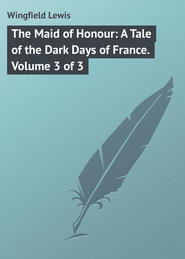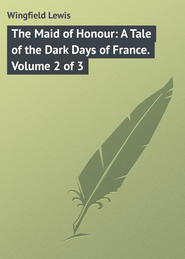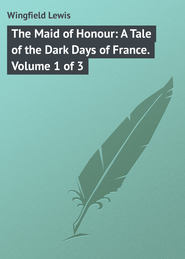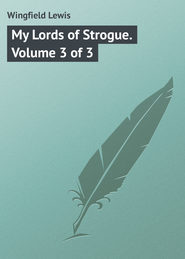По всем вопросам обращайтесь на: info@litportal.ru
(©) 2003-2024.
✖
My Lords of Strogue. Volume 2 of 3
Настройки чтения
Размер шрифта
Высота строк
Поля
'A good brew,' Terence announced, presently, amid solemn silence. 'We'll sit up all night, for there's much to be done. To-morrow I shall vanish from the world-in the body.'
'It's curious that you should ever have turned Croppy, Master Terence,' the giant mused, as with cuffs turned up he peeled the lemons. 'You-a member of the Englishry, who may become my Lord Glandore to-morrow-fond as his lordship is of fighting. But then, of course, ye'd change your politics. Sure your head'll come to be worth a big lot, if the rising doesn't succeed-a power of money, surelie!'
'But it shall succeed!' returned Terence, cheerily, 'Then it will be our turn to offer rewards. What will Lord Clare be worth, think you?'
'He'll never fly,' asserted the giant, eyeing his punch with lazy satisfaction. 'When Ould Ireland's fought her fight and conquered, we'll find he's died game in the streets somewhere. His behaviour on the Green to-night was quare, though-devilish quare! – It's absent in the body ye say ye'll be?' he asked, after a pause; 'but present in the spirit, I hope, for Erin's sake?'
'Never fear! One more glass of punch, and then to work. You think the first place Sirr would look for me would be at Strogue? But if, seeing the danger, I had fled from Strogue? Where would he search for me then? In the liberties about St. Patrick's-the Wicklow Hills-anywhere but in the neighbourhood of Strogue. Yet no neighbourhood could be so convenient. Men go fishing there in little boats, and may land from time to time without causing suspicion. If there was an alarm, it would be strange if I could not conceal myself among the rocks, or get across to Ireland's Eye, and baffle pursuers somehow till I was fetched away.'
'It's a pity, councillor, that the shebeen was burnt!'
'Better than the shebeen, old friend! Now I'll tell you a secret. You can keep a secret? Of course you can, for my sake and that of the good cause. That old figure of fun, Mrs. Gillin-whom my mother hates, for some odd reason-has, for some other odd reason, taken a fancy to me. That's funny, isn't it? She told me one day, that if ever I needed help which she could give, I might rely on her. Now where could I better conceal myself than at the Little House? It's within easy access of Dublin. No one is aware that I even know her, for we haven't exchanged more than half a dozen words in our lives. Though she's a Catholic, her daughter isn't; and, being anxious to make that young person my Lady Glandore, she naturally is interested in the aristocratic party. At the same time she feels the position of her co-religionists. I've been credibly informed so. Isn't that a good idea? Her place is in a manner sacred. She's a friend of all the judges.'
Cassidy ruminated, and whistled a soft air.
'A capital idea indeed! Then ye'll disappear, and I'll not see ye, maybe, for months-that is, till the signal's given.'
'How so?'
'Madam Gillin and I aren't friends. She'd not like to see me hanging about her doors. It wouldn't be prudent, neither. You'll be afther playing your big part while I play my little one. I'm right with the Castle people, as yourself knows well. Sirr likes me, so does Secretary Cooke. I'll ingratiate myself still more wid 'em. When the signal comes, maybe we might take the lord-lieutenant in his bed. It's worth considering. Anyhow, I'd better seem cool with the society. I won't come to the Little House. Don't talk to her of me-'twould vex the mistress.'
Terence trimmed the lamp, knitting his brows the while.
'I hardly like your intimacy with the Castle-folk,' he said. 'It seems scarcely manly to worm out their secrets under a mask of friendship.'
Cassidy burst into one of his great laughs.
'Oh murther, Master Terence!' he cried, wiping the tears from his eyes. 'Ye'll never win Erin's battles if ye're so lofty. We must fight men wid their own weapons if we'd beat 'em. That's true generalship. They set their spies on us. We set ours on them. That's quits, I know, though I am a booby. Take your pen now. Here's a list of the country delegates: mark out who ye think'll be best, while I brew another bowl.'
'No more, Cassidy, my friend! Let's keep our heads clear for business.'
'Be aisy! One more'll do neither of us harm.'
It was five o'clock before Terence was satisfied with his work. He had a task which was uncongenial to his habits, for he was more skilful with the rod or gun than with ink; and it was a matter of grievous slavery and toil to draw up a series of letters, such as should explain clearly to the country leaders of the United Irishmen the full bearing of the late disaster.
Tom Emmett, Neilson, Russell, Bond, were in duress. A temporary arrangement must be come to, lest the French should arrive and find the patriots chaotic. No time was to be lost, for they might appear at any moment, when it would be above all things needful that French and Irish should be prepared to act in concert without loss of time. He, the writer (old college-friend as they knew of the incarcerated leaders, late special envoy also to France), was willing to co-operate with the rest in forming a provisional committee, etc., etc.
Wearied and worn out with the unaccustomed mental effort, he dropped the pen at last from his stiffened fingers, and, wrapping his riding-cloak around him, sank well-nigh at once into deep slumber; while Cassidy, instead of following so good an example, placed the bundle of letters in his long-flapped pocket, and stood for a minute looking down upon the sleeper.
'The dark colleen may never be mine,' he muttered between his teeth, while he wagged his bullet-head; 'but she'll not be yours neither, my fine fellar!' Then, peering out into the silent street which was paling wan in the early dawn, he stole forth on tiptoe, over the body of Phil, lying prostrate across the passage, and opening the door stealthily, made the best of his way towards the Castle.
The day was half spent before Terence woke. The giant, who could turn his hand to most things, washed and aglow with health, was busily preparing breakfast: broiling steaks over a fire, fussing hither and thither as merry as a grig, assisted by Phil, who was kept on the broad grin by his lively sallies.
'The commander-in-chief of the national army is taking it out of Murphy while he can!' he roared in his jolly voice. 'Well, let him lie, God bless him! By-and-by it's little he'll see of Murphy-riding about all night along the ranks to encourage his troops for the battle. What! awake, Master Terence? I've bin up this long while. Your letters are on the road. I've tidied up the room, and opened some tipple for your meal. What'll I get from ye, gineral? Is it your eu-de-shamp that ye'll be making me? It's glad I'll be of the office. I've bad news, though, for ye too. I met Sirr just now, who was on the prowl. The French expedition's come to grief again! No mather! we'll fight now for ourselves-bad luck to the mounseers, they are chicken-hearted! That at least is the official news, arrived from London a few hours ago.'
Terence rubbed his eyes and stared, unable on first awaking to realise such disastrous intelligence. Then he dipped his head in a basin of water which Phil presented to him, tidied his dress, combed out his long hair, and caught it back with a ribbon in the accustomed manner. After that he set to work upon a luscious steak with the energy of youth, and washed it down with claret, while Cassidy, too, made pretty play with knife and fork-both of them too preoccupied for speech.
Another French fiasco! How strangely fortune favoured England! This time the fleets had remained weather-bound, unable to start at all until the golden moments were gone-till opportunity had slid into the past. It was too bad. Terence's blood boiled whilst he assuaged his tremendous appetite-so did Cassidy's, finding vent as usual in loud oaths and noisy execrations.
After breakfast the two shook hands and parted-when to meet again? – when and how? – under what strangely altered auspices? It was agreed that the members of the new Directory should communicate in the first instance with Terence, in person, somewhere on the shore near the Little House where he was to hide. The letters would speedily reach their destinations, Cassidy assured him. This new turn of events might induce Government to take active measures of some kind. What would they do? Repent them of their evil ways and take to leniency, or, thinking they had their victim quite at their mercy, still further goad and harass her? What would Terence's private enemy do-he of whom my Lord Clare so mysteriously spoke?
With so many spies about, it was almost inevitable that the active part that the young councillor was playing would become known to Government. Would they wink at this backsliding of an aristocrat-or would they make an example of him by putting a heavy price upon his head? Be that as it might, it would never do, in Cassidy's opinion, for him to share the fate of Emmett and the others. The giant was vehement on this point. He must go into hiding forthwith, and employ the most extreme precautions lest Sirr should discover his lair. Cassidy, being known as his friend, would make a point of never taking the air in that direction. He would hang about the Castle ostentatiously, and report what he might have to say to some prominent member of the society, who would take up his abode in Dublin. Indeed he thought it would be wise to abuse the society in public-to declare that once he had been seduced by specious argument into joining it, but that now he saw the error of his ways, and sang 'Peccavi.'
Much as he disliked his method, Terence was obliged to confess that the giant was right, and felt at the same time a small internal marvelling in that he was really shrewd and rather astute-by no means the hopeless bungler that Emmett had considered him.
He took hearty leave of his friend, and, accompanied by Phil, made the best of his way to Strogue. It was a gloomy place to live alone in, as he had discovered since the departure of the family. Even his brother's sneers and his mother's coldness were better than this chilling solitude. He lived at this time in his own little chambers in the 'young men's wing' under the armoury, gaining access to them by his own private door, so that the Abbey was to all intents and purposes shut up, being only inhabited by a few old retainers who dwelt away over the stable-yard at the other side of the house. To his dismay his things had been disturbed-he detected the fact at once. By whom? How tiresome old family servants are! Disobeying orders, they will rummage and clean by fits and starts, regardless of the havoc they innocently make. Then Terence remembered that neither old Kathy nor her spouse, Tim the coachman, were more given to cleanliness than Irish domestics usually are.
This must have been a sudden and most inconvenient gush of virtue! He would at once give Tim and Kathy a vigorous bit of his mind. They should be convinced for ever after that obedience is the most cardinal of all the virtues as far as servants are concerned, standing indeed before cleanliness. They should shiver and quake in their shoes after the jobation their young master would administer. But instead of quaking they both lifted up their voices and howled, swearing that young masther was distraught. Go among his bits of things indeed! Not they. Sorra a haporth of dusting had they done. Why should they, since master agreed with them that it was waste of labour? Kathy had stepped in to make the bed, but finding it undisturbed, had stepped out again at once. Then somebody else must have been there. Who could have an interest in the few scraps of property which were of no value at all except to their owner? The fishing-rods were overset-the cupboards had been rifled-the precious collection of hackles (apple of Phil's eye) were strewn on the floor as if somebody had been in haste, searching for some special object which he could not find.
The owner of the treasures began to look grave. Who would steal his things-things moreover which were not worth stealing? None of the peasantry about. Irish peasants, though they will pick off their man blithely from behind a stone, are little given to petty pilfering.
Terence looked around, and his heart beat fast. Nothing had been taken except-his papers! Rough drafts of manifestoes, over which, in the hot zeal of youth, he had consumed the oil of midnight. Projects for the capture of the gaols-rough plans; the very documents which, being compromising and not particularly useful, he had come hither to destroy. How silly and imprudent not to have destroyed them sooner!
Sirr for months past had been in the habit of making forcible entries into houses, on the chance of unearthing treason. What more likely than that he should think of making a perquisition upon Councillor Crosbie, who flaunted his opinions before the world in the outward form of a green tabinet neckerchief? Fool-babyish dolt! Idiot! Every one had spoken about that necktie. In a passion he tore it from his throat, and hurled it out of the open window. Conduct more childish still! The evil was done. Could it be remedied? His smooth forehead puckered itself into wrinkles as he strove to remember what the bundle of documents contained. Three forms of manifesto-to be printed and placarded so soon as Dublin should be taken. The rules and regulations of the society. A memorandum of prominent members-oh, horror! He knew he had been suspected of treachery by some. This list, incautiously kept, might bring about the death of many. Would he not be guilty, by gross carelessness, of their murder? Would they not have a right to curse him as they swung?
For a while his spirit was invaded by the same rush of unworthiness which had so unnerved Tom Emmett when he was arrested. He too felt the bitter sense of upbraiding humiliation with which Tom had asked himself what right had one, who was incapable of common prudence, to traffic thus rashly with the lives of other men? Do his duty! Was it his duty to put himself forward in this affair, or was it merely a culpable personal vanity disguised as self-sacrifice? He strove earnestly to settle that question-so earnestly that Phil, who watched him, was aghast at his distress, and endeavoured by humble barks and frolicking: to cheer his master from the dumps. To no purpose. With grief be it admitted that his master cursed him roundly, abused him with such unnecessary harshness that the poor fellow slunk away with tears in his eyes, under pretence of fetching the green kerchief. Big drops of sweat stood on the young man's brow. His brains had never in all his years been so tried as during the last few months. Only those usually unused to thought can tell of the dreadful addled feeling of helplessness which comes upon the muddled intellect during its first feeble struggles into work.
After a time he grew calmer, as the one bright point stood out distinctly. It was not the vanity of power-the attribute of Jack-in-office, which had galvanised his careless nature into serious purpose. Look at it how he would, he was clearly above such meanness. He had no personal ambition-that was what Doreen had constantly dinned into his ears with scorn-and he had wished that, to please her, he could have become ambitious. But it was out of the question. He liked the world-its bright sun, its flowers, its myriad life-but with no desire for exclusive possession of its delights. He was not discontented with his lot, even though his brother was rude sometimes, and his mother cold and unaffectionate. His only troubles had been his trivial debts; they alone had stirred his brains to scheming, and he had borne them good-humouredly as his share of the ills of life. He thought Doreen bewitching-deliriously delightful. Her he would fain possess as his own-his very own. There was nothing specially ambitious in that; for the lowly sparrow, as well as the stately fowl of Cochin, is justified in seeking out a mate-the best who will accept him. No; he was indolently, comfortably content to take the world as he found it, making excuses for its bumps, palliating its disagreeables-until that time when his eyes had been opened as though scales had fallen from them. Since then he was an altered man; sobered by the shock of suddenly perceiving the precipice on which his country stood. At first he had refused to gauge the depth of the abyss; it was so much pleasanter to turn aside to dally with the flowers. Then the upright courage which had hitherto lain dormant spoke, bidding him mark Erin's loveliness-commanding him to stretch out his hand to stay her tottering form, whispering sternly that if she fell before his eyes without an effort made to save, the guilt of her shattered limbs would haunt him for evermore.
No! His conscience absolved him of personal ambition. If Erin were saved through his agency he would be content to retire again into the background-well-paid by her grateful smile. His error had been great, because its consequences might be serious. But humanity is prone to error. Youth must learn experience by stumbling. A man must expect to receive many stabs who fights with a concealed enemy. He must practise prudence, make no movement without exceeding caution; but at the best what a disheartening conflict-what a one-sided fight!
Terence had received two blows this very day. France could not be depended on for help. Twice within less than a year had she made herself a laughing-stock. And now-this capture of his papers, which, if the foe were relentless, would compromise him hopelessly. It was more than ever needful to conceal himself, if his life were to be of real use before he laid it down. Trouble seasons the character quickly. The young man was already beginning to calculate expediencies with gravity and precision. If he was spared, time might make of him a valuable champion.
He whistled Phil, who came up fawning like a hound that is forgiven.
'Follow me. And whatever you do, keep your tongue within your teeth,' he said. Then calling Kathy, he flung to her the key of his little door, remarking that he was called to Cork on business, and might be long detained. If my lady should write (alas! she never wrote) the letters might wait.
Then, followed by his faithful henchman who shouldered his fire-iron as though meaning business, he turned out of the great gate up the by-lane which led, before meandering elsewhere, to the back-entrance of the Little House; rung the bell, and waited to see the mistress.
Madam Gillin answered it in person, bedizened in a weird wrapper, a wisp of soiled crape wound over the curl-papers about her head and under her chin like a cerecloth. Her sleeves were tucked up above the elbow. In her hand she bore a rolling-pin; her fingers wore a cuticle of dough. Expressing no surprise, she remarked simply:
'I expected you before this. There is no one in the house but myself, Norah, and the collough, my ould nurse. She's to be trusted. Ye're welcome, and your man. Come here, Norah; kiss your brother-in-law as will be some day. You may kiss me too, for I mean to be your aunt-in-law. Look me in the eyes. A handsome fellar! I know more of you than ye'll ever know yourself, unless the Holy Mother wills it. Come in, for we may be watched; and bar the door.'
CHAPTER XI.
THE RISING OP THE TEMPEST
Nothing could be kinder than the stout homely lady's treatment of her guest. He seemed to have a sad sort of fascination for her. He caught her watching him sometimes with a queer expression of pity, which broke into amicable grins and head-shakings so soon as she found herself detected. Norah, too, turned out to be a good-natured, unpretentious creature.
On the whole, Terence was not surprised at his brother's choice, considering what a terror that truculent individual betrayed for high-bred damosels, and how little he was able to appreciate the refined fascinations of the haughty, calm Doreen.
'It stood to reason,' so Terence argued, 'that if he were blind to the existence of a divinity who, in semblance of a mortal maid, abode by his fireside, then, of course, his senses must be gross, and nothing would suit him but a house-wench.'
Despite the draggled ball-room finery in which Norah elected to array herself for breakfast, in honour of the guest, he could not but perceive that she was no better than a serving-wench in mistress's attire. But then she was a cheery, pleasant house-wench, instead of a designing, cross one, as might have been the case. So he clasped her to his bosom, and the twain were soon fast friends.
In the kitchen things did not go so smoothly. Phil's orders were that he must never go out by daylight; so he sat in the kitchen all day long, staring at Jug Coyle, the collough, who sat muttering and growling as she stared at him.
For many years, when mistress of the 'Irish Slave,' Jug had nourished a resentment against this unoffending youth, shaking a lean fist at him as he passed her door, muttering a curse when he called in for 'the laste taste in life of the crayther.'











